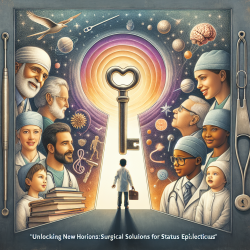As we continue to navigate the challenges posed by the COVID-19 pandemic, the realm of speech-language pathology has seen a significant shift towards virtual therapy. The study "In Videobehandlungen trotz Distanz Nähe schaffen" provides valuable insights into how psychotherapists have adapted to this change, highlighting both the benefits and challenges of video-based therapy (VBT).
From the research, several key findings can help practitioners improve their virtual therapy skills:
- Flexibility and Accessibility: One of the most frequently mentioned advantages of VBT is the flexibility it offers in terms of location and time. This allows for continuous therapy sessions even during lockdowns, ensuring that patients do not miss out on essential care.
- Maintaining Continuity: VBT has been instrumental in maintaining the continuity of therapeutic contact during the pandemic, which is crucial for patient progress and mental health stability.
- Technical Challenges: While VBT offers many benefits, it also comes with its set of challenges, primarily technical issues such as unstable internet connections and the lack of nonverbal communication cues. Practitioners need to be prepared to troubleshoot these issues promptly to ensure smooth sessions.
- Patient Acceptance: Most patients have accepted VBT positively, appreciating the continuity of care. However, some patients may still prefer in-person sessions. It’s important for therapists to gauge patient comfort levels and adapt accordingly.
Implementing these insights can significantly enhance the effectiveness of virtual therapy sessions. Here are some practical steps practitioners can take:
- Invest in Reliable Technology: Ensure that both the therapist and the patient have access to reliable internet connections and quality video conferencing tools.
- Enhance Communication Skills: Focus on improving verbal communication skills to compensate for the lack of nonverbal cues. This includes clear articulation, appropriate pauses, and active listening.
- Regular Feedback: Encourage patients to provide feedback on their virtual therapy experience. This can help in making necessary adjustments to improve the quality of sessions.
- Continued Education: Stay updated with the latest research and developments in virtual therapy to continuously refine your skills and techniques.
For many therapists, VBT may have started as a temporary solution during the pandemic, but its potential to address long-standing issues like rural under-provision and patient accessibility is undeniable. By leveraging the advantages and addressing the challenges, virtual therapy can be a powerful tool in a speech-language pathologist's arsenal.
To read the original research paper, please follow this link: In Videobehandlungen trotz Distanz Nähe schaffen










